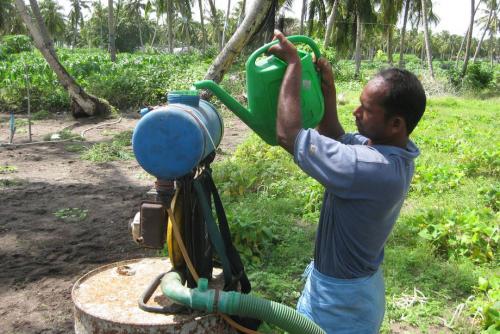UN human rights experts call for global treaty to regulate dangerous pesticides
Two United Nations human rights experts are calling for a comprehensive new global treaty to regulate and phase out the use of dangerous pesticides in farming, and move towards sustainable agricultural practices.

Tropical smallholder farmers do not always use protective gear while handling pesticides.
“Excessive use of pesticides are very dangerous to human health, to the environment and it is misleading to claim they are vital to ensuring food security,” the Special Rapporteur on the right to food, Hilal Elver, and the Special Rapporteur on Toxics, Baskut Tuncak, said in a joint statement to the Human Rights Council in Geneva.
The Special Rapporteurs pointed to research showing that pesticides were responsible for an estimated 200,000 acute poisoning deaths each year. Some 99 per cent of fatalities occurred in developing countries where health, safety and environmental regulations were weaker.
Chronic exposure to pesticides has been linked to cancer, Alzheimer’s and Parkinson’s diseases, hormone disruption, developmental disorders and sterility. Farmers and agricultural workers, communities living near plantations, indigenous communities and pregnant women and children are particularly vulnerable to pesticide exposure and require special protections.
The experts particularly emphasized the obligation of States to protect the rights of children from hazardous pesticides, also warning that certain pesticides can persist in the environment for decades and pose a threat to the entire ecological system on which food production depends.
While acknowledging that certain international treaties currently offer protection from the use of a few pesticides, they stressed that a global treaty to regulate the vast majority of them throughout their life cycle does not yet exist, leaving a critical gap in the human rights protection framework.
“Without harmonized, stringent regulations on the production, sale and acceptable levels of pesticide use, the burden of the negative effects of pesticides is felt by poor and vulnerable communities in countries that have less stringent enforcement mechanisms,” they emphasized.
Special Rapporteurs and independent experts are appointed by the Geneva-based UN Human Rights Council to examine and report back on a specific human rights theme or a country situation. The positions are honorary and the experts are not UN staff, nor are they paid for their work.
Source:United Nations
- 288 reads
Human Rights
Ringing FOWPAL’s Peace Bell for the World:Nobel Peace Prize Laureates’ Visions and Actions

Protecting the World’s Cultural Diversity for a Sustainable Future

The Peace Bell Resonates at the 27th Eurasian Economic Summit

Declaration of World Day of the Power of Hope Endorsed by People in 158 Nations

Puppet Show I International Friendship Day 2020

